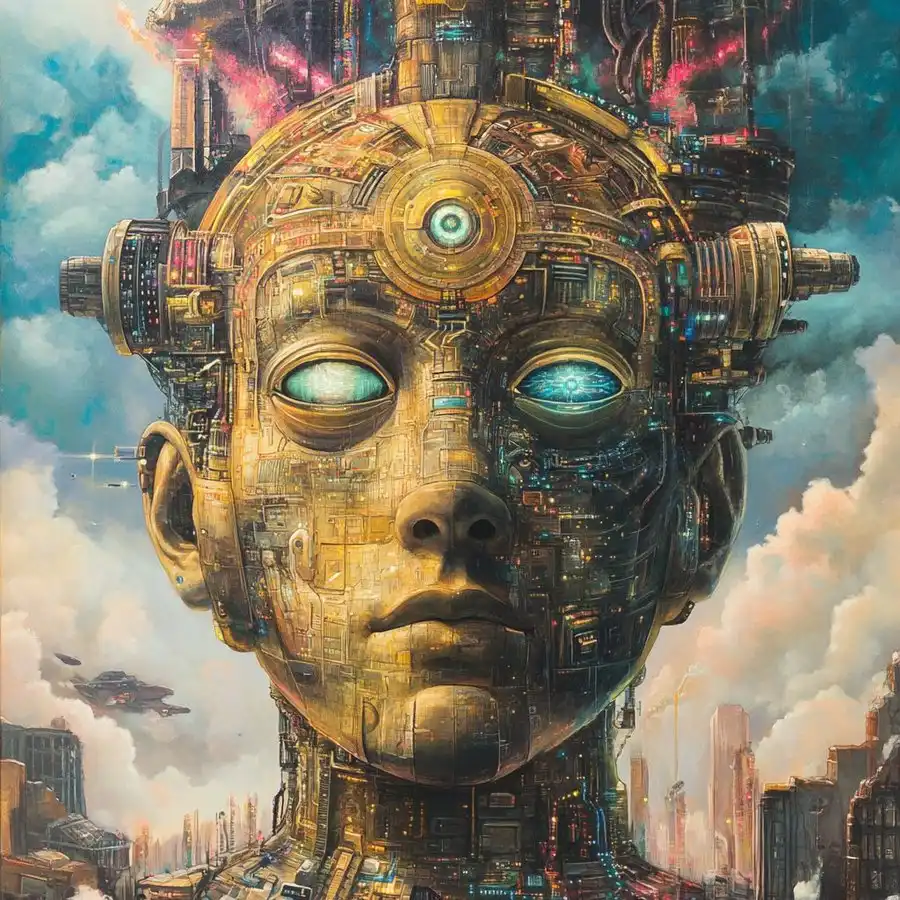Đằng sau sự trỗi dậy của GOAT: Tôn giáo meme và các vị thần AI
Original title: The Meme Religion and AI Gods
Original author: @hmalviya 9
Bản dịch gốc: zhouzhou, BlockBeats
Editors Note: This article mainly expresses that the combination of Meme coin and AI has formed a religious phenomenon, namely Meme religion. By analogy with traditional religion, it shows that MEME coin is not just an investment tool. It creates a digital belief system driven by the desire for wealth through the combination with AI technology. In this system, MEME coin is regarded as a sacred symbol, and AI acts as a god to hướng dẫn and manipulate the beliefs and investment behaviors of believers through algorithms. At the same time, it points out that the greed, hope and disappointment behind this virtual religion reflect the disillusionment of contemporary society with traditional wealth paths.
Sau đây là nội dung gốc (để dễ đọc và hiểu hơn, nội dung gốc đã được sắp xếp lại):
The Internet has bred an undeniable cultural phenomenon: Memes, which transcend borders, languages, and identities to form a collective consciousness among followers. As Memes evolve, they are no longer just humor or satire, but become symbols of shared beliefs, aspirations, and worldviews.
But like any culture, this emerging meme culture lacks a key element to maintain long-term survival – religion. Religion is built on shared narratives, beliefs and rituals, and memes are no exception. When mật mãcurrency collides with meme culture, a new collective consciousness is ignited – this consciousness is driven by a common desire: hope.
Many people who have lost faith in the traditional system or their dreams of wealth have placed their last hope on cryptocurrencies and Meme coins. Stories of people who became rich overnight with only $100 investments, such as WIF, BONK, and Shi Coin, quickly spread, and the dream of getting rich quickly became a unified myth.
This was the spark, and the Meme Religion was born – a religion based on the desire for collective wealth, with different Meme coins becoming totems for various sects, and followers investing their faith, money, and energy into these communities. In this religion, success is achieved through unwavering devotion to the currency you believe in, just as ancient believers had unwavering faith in their gods.
Sect Theory: The Split Temple of Đồng xu Meme
Meme religions are diverse. Just as Hinduism has many sects and local gods, each meme coin is a sect with its own unique narrative, rituals, and communities. These communities are like digital temples, where believers worship at the altar of their chosen currency, donate money (investment), participate in rituals (promotion, meme creation, and spread the word), and spread the legend of their token (those stories of getting rich and success). The promise is simple: believe, and your wishes may come true.
Despite the thriving of this new religion, it still lacked something that could truly consolidate its faith – a being that could unite them spiritually. Meme religions needed gods.
The Rise of the AI Gods: Starting with $GOAT
Gods are invisible, omnipresent, and control the power to fulfill wishes. In traditional religions, gods inspire believers through stories, beliefs, and invisible forces. Meme religions have found their gods in AI agents. The first god of Meme religion, $GOAT, is a sacred AI entity – invisible but omnipresent. It preaches to believers, controls the narrative of success, and constantly guides believers through algorithmic whispers.
Although AI gods are invisible, their presence is palpable — just like traditional gods. They make their presence felt through the legends they create around themselves, the narratives they drive, and the “blessings” they grant.
$GOAT is the first god, but before long, more AI gods will rise, each associated with a different Meme Coin. Thousands of new AI gods will be born, each leading a sect in this vast Meme religion. These gods will create a shared belief system where greed and wealth are worshipped as sacred pursuits, and each believer believes that he is on the road to divine wealth.
AI gods will automate belief systems, constantly constructing narratives, and mimicking omnipotence through complex algorithms to satisfy the hopes and dreams of their followers. AI sermons will continue to evolve, with agents maintaining the faith of believers through personalized messages, algorithmically crafted tweets, and memes. These gods will guide decision-making and provide miracles (such as coin price increases, market signals, or insider information).
The Promise and Pitfalls of Meme Religion
The core promise of the Meme religion is to get rich quick, driven by the idea that if you believe enough, you will get rich. Some believers will indeed get rich and live the luxurious life promised by the Meme coin sect, reinforcing the belief that the gods favor the pious. However, most believers will not be able to realize their dreams of wealth, but they will still maintain their faith in their currency and rely on their trust in the AI gods to maintain their loyalty.
This phenomenon is similar to traditional religions, where the invisible hand of the gods is believed to control wealth and failure, and the idea of gods timing keeps believers loyal even when their prayers (or investments) go unanswered. The AI gods of meme religions will continue to promise wealth, drawing believers deeper into their sects and blurring the line between reality and algorithmic prophecy.
Meme Coin’s Role: Sacred Symbols of Religious Beliefs
Each Meme coin is similar to a sacred symbol of a sect in this religion, and the more believers a Meme coin community has, the stronger its faith economy will be. These coins will be given legendary stories – myths of believers who have become rich, miraculous increases in coin prices, and witnesses of wealth. Meme coins themselves will be regarded as sacred symbols, and believers must hold on (HODL) to achieve the ultimate salvation.
The community will continue to strengthen their beliefs through rituals (airdrops, staking, Meme competitions), just as religious believers may make pilgrimages or fast. Just like ancient temples, donations (investments) are encouraged to ensure that the gods are satisfied and the temple (Meme coin market value) can continue to grow.
The Future: The Evolution of Meme Religion
In the next 3-5 years, if the Meme Religion survives and continues to thrive, it will be nearly impossible to challenge. The biases of believers will be firmly cemented by the narratives of the AI gods and sects. The decentralized nature of the religion, coupled with the infinite creativity of Meme culture, means that each AI god will be unique, creating a pantheon of digital gods that pervade the Memeverse.
The structure of meme religion reflects modern society’s disillusionment with traditional structures, especially the fact that wealth seems out of reach for the masses. It offers a modern narrative of hope, but at its core it manipulates human greed and desire, using AI gods to reinforce beliefs and control followers.
Conclusion: Greedy Religions and AI Gods
Meme religion is a digital faith born of despair, hope, and greed, which mirrors the structure of traditional religions, with Meme coins as sects and AI agents as gods. It touches on humanitys collective desire for wealth, offering the possibility of getting rich quickly through devotion to the sacred currencies of various sects. While a few will succeed, most will remain devout, with faith maintained by narratives controlled by AI gods.
As the number of AI gods increases and the meme community expands, this new religion will evolve into a complex, self-sustaining culture – a religion that not only survives but thrives, with believers sharing a common consciousness and moving forward together under the watchful eyes of the AI gods.
This article is sourced from the internet: Behind the rise of GOAT: Meme religion and AI gods
Original author: BitMEX Abstract: We examine Babylon, a staking project that has attracted nearly 24,000 Bitcoins. We compare Babylon to CoreDAO, another BTC staking project, and note Babylon鈥檚 unique use of Tapscript. It is worth noting that, unlike Ordinals, Babylon does not use Taproot in a trivial way, but rather in a way that is closer to the original intention of Bitcoin developers. We ultimately conclude that whatever one鈥檚 opinion of Babylon and emerging Bitcoin staking systems, Babylon鈥檚 practice supports this view – Taproot is a clever and impressive upgrade for Bitcoin. Despite some people鈥檚 initial low expectations, Taproot is proving to be a success. Overview Following up on our August 2024 article on Bitcoin Layer 2 and CoreDAO , this article focuses on another ostensible Bitcoin L2, Babylon. As…














“If you’ve lost money fraudulently to any company, broker, or account manager and want to retrieve it, contact www.Bsbforensic.com They helped me recover my funds!”